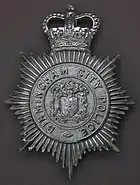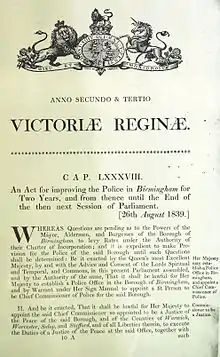Birmingham City Police
Birmingham City Police was the police service responsible for general policing in the city of Birmingham in England before from 1839 to 1974. The force was established by a special Act of Parliament in 1839, and was amalgamated as of 1 April 1974 with the West Midlands Constabulary and parts of other forces to form the West Midlands Police as part of the omnibus Local Government Act 1972.
| Birmingham City Police | |
|---|---|
 Hat badge of the type in use on the last day of the service | |
| Agency overview | |
| Formed | 20 November 1839 |
| Dissolved | 31 March 1974 |
| Superseding agency | West Midlands Police |
| Jurisdictional structure | |
| Operations jurisdiction | Birmingham, England, UK |
| Legal jurisdiction | England & Wales |
| General nature | |
| Operational structure | |
| Parent agency | Home Office |
History

Early history
In 1812, Joseph Chirm was the "Head Borough Constable".[1]
Birmingham town police
Following Chartist rioting in 1839, when one hundred police had to be brought from London, an Act of Parliament was passed on 26 August 1839 "for improving the Police in Birmingham". Birmingham was required to have at least 250 constables and 50 officers.[2] A commissioner was to be appointed by the Home Secretary and report to him.[2] The Birmingham force came into being on 20 November 1839 with 260 men. Francis Burgess, a local barrister, was appointed as the first police commissioner for Birmingham.[3] On 12 August 1842 a new Police Act transferred responsibility to the Birmingham Town Council and another removed doubts as to the authority of the council.[2]
Birmingham City Police
When Birmingham became a city in 1889 the town police became the Birmingham City Police.
World War I
571 officers from Birmingham City Police served in the military during World War I, of whom 50 were killed. All 571 are named on a memorial which is located in Lloyd House, the headquarters of the BCP's successor, the West Midlands Police, and on an accompanying website.[4]
Band
.jpg.webp)
The Birmingham City Police Band was, at one period, conducted by Appleby Matthews,[5] organist of the city's St. Philip's Cathedral and the first conductor of the City of Birmingham Orchestra (later the City of Birmingham Symphony Orchestra). Members of the band would sometimes supplement the orchestras numbers.[6] Subsequently The band was conducted by Richard Wassell, with whom they performrd a number of BBC Radio broadcasts.
The City of Birmingham Orchestra held its first-ever rehearsal at 9.30am on 4 September 1920, in the band room at the Birmingham City Police's Steelhouse Lane station.[6]
Chief Constables
Chief Constables of Birmingham City Police included:[7]
- 1839 – 1842: Captain Francis Burgess
- 1842 – 1860: Richard Stephens
- 1860 – 1876: George Glossop
- 1876 – 1881: Major Edwin Bond
- 1882 – 1899: Joseph Farndale
- 1899 – 1935: Sir Charles Haughton Rafter KBE KPM
- 1935 – 1941: Cecil Charles Hudson Moriarty CBE CStJ
- 1941 – 1945: Sir William Johnson
- 1945 – 1963: Sir Edward Dodd
- 1963 – 1974: Sir William Derrick Capper
References
- The trial and execution of William Booth Who was Executed at Stafford, on Saturday Aug. 15, 1812. For Counterfeiting Forged Bank of England Notes. 15 August 1812.
- Gill, Conrad (1952). History of Birmingham Volume I. Birmingham City Council, Geoffrey Cumberledge, Oxford University Press.
- "History of the Force". West Midlands Police. Retrieved 2014-04-22.
- "Police Memorial". West Midlands Police Military History Society. Retrieved 17 June 2017.
- "City of Birmingham Symphony Orchestra". Sinfini Music. Retrieved 17 March 2014.
- Morley, Christopher (4 November 2010). "A glorious 90 years". The Birmingham Post. p. 4.
- "Birmingham City Police 1839 - 1974". West Midlands Police Museum. Retrieved 10 February 2014.
External links
| Wikimedia Commons has media related to Birmingham City Police. |
- Birmingham Police parade, circa 1914-1918 (Pathé newsreel)
- The Man on the Beat 1945 British Council film about UK policing, made in central Birmingham